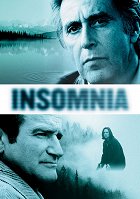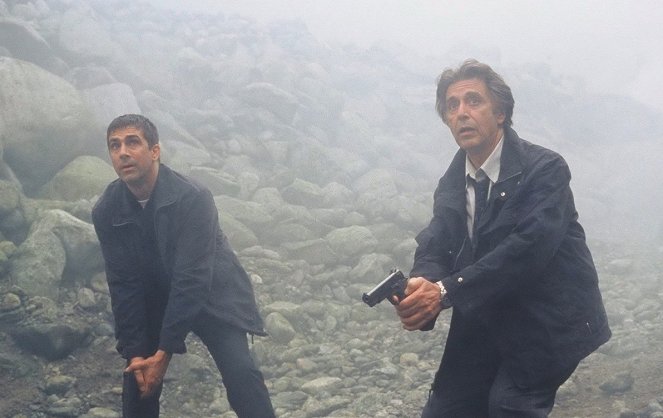Regie:
Christopher NolanCamera:
Wally PfisterMuziek:
David JulyanActeurs:
Al Pacino, Robin Williams, Hilary Swank, Martin Donovan, Paul Dooley, Nicky Katt, Jay Brazeau, Crystal Lowe, Maura Tierney, Jonathan Jackson (meer)Samenvattingen(1)
Een politiedetective wordt naar een dorp in Alaska gestuurd om de moord op een tienermeisje te onderzoeken. Wanneer hij een verdachte probeert aan te houden schiet hij per ongeluk zijn partner dood. Het schuldgevoel, het onderzoek, de aanhoudende duisternis. Het wordt hem allemaal wel eens teveel. (Buena Vista International)
Video's (1)
Recensie (8)
Without its A-list cast, Nolan’s cautious entry into Hollywood would have been just another unnecessary American remake of a high-quality European genre film, also slowly told but much rawer and more atmospheric. In the context of Nolan’s filmography, Insomnia is surprising especially because of its relatively conventional structure (the boldest aspects are the confusing flashbacks, which, with respect to what we know, we attribute to someone other than the one to whom they actually belong) and its brightness, which of course has a thematic rationale (furthermore, the lighting changes as Dormer becomes increasingly disoriented due to sleep deprivation). Otherwise, this is, after Following and Memento, the third story of a man traumatised by what happened to him in the past and who is prevented by time from getting a firmer grasp of the situation. Time is Will Dormer’s enemy in the sense that it does not allow him to sleep during the given season in Alaska. Besides investigating a murder and trying to cover up the fact that he himself has committed a crime, he begins to lose his nerve and to make mistakes due to his deepening fatigue. Of course, due to the fact that Al Pacino looks rather worn out from the opening minutes, his transformation consists mainly of chewing more and more intensely and the circles under his eyes getting bigger. Not even Robin Williams gets much room to show off his acting talent, as he maintains a poker face most of the time (which obviously had the purpose of making him seem more sinister, but it doesn’t really work). Nolan simply doesn’t care as much about the characters and their plausibility as he does about the comprehensibility of the narrative for the viewer, which is more jarring in a film largely based on actors than in films whose main draw is unique composition. For example, the behaviour of the hotel receptionist, who forms an attachment to Will, who thus has someone to whom he can confide about one of his past sins (thus fulfilling the receptionist’s sole narrative purpose), makes very little sense. More disturbing are the other “traditional” deficiencies of Nolan’s films – dividing scenes into an unnecessarily large number of shots (as if the filmmaker was afraid that we would lose interest if a shot lasts a little longer), excess dialogue explaining in detail what could have been simply hinted at, faulty spatial relationships between individual shots (an actor is suddenly somewhere other than where he should be based on the previous shot, which is partly due to the overuse of editing). Compared to his more spectacular later films, Nolan doesn’t make much use of locations to shape the mood, which is really a shame given the genre and the setting. However, Insomnia cannot be denied its consistent work with props (the murder weapon, the bullet, the alarm clock) and precisely timed turning points (at first, the twists come every twenty minutes and then every ten by the end), thanks to which the film is relatively briskly paced despite its somnolence. In any case, this is the only Nolan film that I’m not tempted to watch again (for the third time). 70%
()
(minder)
(meer)
A professionally and creatively shot crime thriller that utilizes a decent budget and can afford to have an exceptional cast. Al Pacino and Robin Williams are great actors, and especially the screenplay gives significantly more space to Williams compared to the original Norwegian film, making him an exceedingly dangerous opponent. Compared to the European version, the American film is, of course, more polished, with the role of the policewoman played by the charming Hilary Swank, and the showdown between the criminal and the policeman naturally ends with catharsis and punishment of evil, which cannot be said for the European version. Nevertheless, it is a film fully comparable to the original. It is just not as authentic and raw, but instead indulges in beautiful shots of Nordic nature and provides the viewer with additional emotionally charged experiences such as well-executed intense fights to the death. Overall impression: 80%.
()
After the brilliant Memento, Nolan reached for someone else’s script and once again he didn't go wrong. A great thriller that has more to offer than other similar genre films. The magical atmosphere of the Alaskan setting, the tired and circumstantially depressed Al Pacino, and Williams in an unconventional role (and he's good at it!), it's simply worth watching. The ambiguity of the behaviour of Detective Dormer, investigator and accomplice at the same time, adds a new, unusual dimension to the narrative. And if you happen to suffer from insomnia, add another star :)
()
After Memento, Insomnia feels rather sleepy in terms of the directing, and Christopher Nolan's creative geysers remain quietly asleep this time. We do not see any magnificent narrative strategies, but rather the clever grasp of the conventional narrator and his addition to fragmented fragments of retrospective. Otherwise, Insomnia is standard fare, which does not lack atmosphere, but unfortunately it feels... well, sleepy. An unequivocal positive are the excellent acting performances of everyone, Al Pacino above all, as well as a very interesting script that plays with expected clichés. Insomnia is definitely not one of the best thrillers, as it has the slightly bitter aftertaste of routine and wasted potential. Nevertheless, it is an extremely intelligent and interesting film.
()
A sleepy Pacino, a psychopathic Robin Williams and the perfect directing from Christopher Nolan are the trumps in the hand of this criminal drama. As the days go by, the light burns into your eyes more and more, and the same happens to Dormer himself, the atmosphere thickens with each tired blink and the ending, which isn’t overly showy, still astounds you. And now please leave me be... I want... to sleeeep...
()



